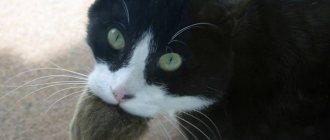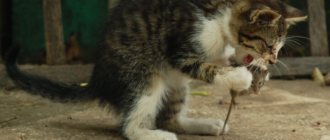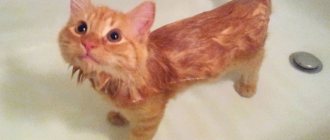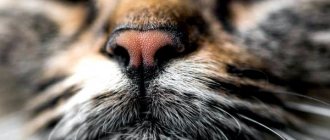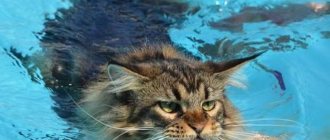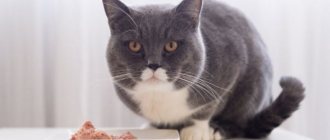For most of us, cats are the embodiment of home comfort, tranquility and laziness. Few people would think that these charming couch potatoes can bring tangible benefits. And yet it is so. Today we will talk about rat-catching cats that can clean the house and surrounding area from mice and rats
Despite the fact that all cats are predators, not everyone can become a good rat catcher. The rodent hunter must have strong bones, well-developed muscles, long, dexterous paws and (optional) striped or tri-colored coloring that will provide good camouflage.
Gender matters too. Ratcatching cats are very rare; cats usually hunt rodents. They are driven by maternal instinct, or more precisely, by the need to feed and protect their offspring.
If a cat actively catches mice and rats, she will teach her cubs to do the same. Therefore, they should not be separated from their mother earlier than 4-5 months after birth.
Since domestic cats have been living with humans for hundreds of years, they have no urgent need to get their own food. Therefore, in many ornamental varieties, hunting instincts have been lost. On the other hand, there are many breeds that were and remain excellent predators and in which the hunter gene is highly developed.
European shorthair cat
Small smooth-haired animals of gray striped, spotted or marbled color are considered to be outbred. But these “plebeians” caught rats and mice back in Ancient Rome. The European Shorthair cat is a strong, agile and intelligent animal. She loves and knows how to hunt, and at the same time has good contact with people. However, if you pick up a mongrel kitten on the street, you shouldn’t hope that it will start exterminating rats left and right. As a rule, private breeders or nurseries are engaged in breeding really high-quality rat-catcher cats, and often there is a queue for offspring almost a year in advance. If you want such a cat, look for trusted breeders with recommendations, but remember that it takes 4-5 months for a mother to teach her cub predator skills, so you should give preference to older kittens.
Ratcatcher cats can catch rats, mice, snakes and moles equally well, but they will also calmly deal with domestic animals - ducklings or chickens. Therefore, it is important to raise the animal correctly from the very beginning.
Is it possible to teach an animal to hunt rodents?
The kittens are taught hunting skills by their mother, but in her absence the owner has to do this. Animals living outside hone their skills not only on rodents, but also on insects. At home, they can be replaced with special toys: teasing fishing rods, jingling balls, a laser pointer and wind-up mice.
IMPORTANT!
Do not starve your pet to awaken its predatory instincts. It will not spur him on to hunt, but will simply deprive him of his strength.
It is almost impossible to achieve results as an adult, so games with catching moving objects should be introduced in childhood, before 4 months. Be sure to give your pet the opportunity to take possession of the toy and praise him for catching the prey. Thanks to regular training, he will be able to hunt on par with those who were trained by his mother, but with one difference - the absence of the desire to kill and eat caught prey.
Siamese cat
Another hunting breed with a long history. The first mentions of blue-eyed beauties date back to the 13th century. They come from the kingdom of Siam. Smooth-haired, lean animals are distinguished by excellent reactions and the ability to show aggression when necessary. Siamese get along well with people, but have a rather independent disposition. Their small size does not allow these cats to hunt rats effectively, but they do an excellent job with mice. The instinct is transmitted at the genetic level and strengthened in kittens by their mother.
The rat is a fairly large rodent, and therefore the hunter should not be small. It is necessary that she has well-developed muscles, skeleton and jaws, and a stable psyche. If she hides or runs away from any loud sound, the cat will no longer be able to become a good rat catcher.
Is it true that castrated animals hunt worse?
Castration changes natural hormonal levels. Along with the loss of reproductive function, the animal is deprived of its usual activity. Metabolism slows down, and eating the usual amounts of food leads to sudden weight gain and obesity.
Along with extra pounds comes laziness and passivity. It becomes very difficult for a fat cat to move, so along with the love of games, the passion for hunting fades away.
Thus, castration does affect the hunting instinct, but not directly, but through excess weight. As long as you maintain your original fitness level, monitor your daily calorie intake, and encourage physical activity, your ability to hunt rodents will continue.
Maine Coon
These luxurious, large (weighing up to 15 kg) cats come from America, more precisely the state of Maine. They were specially bred to exterminate mice and rats on farms and ships. Despite their impressive size, Maine Coons are agile and agile. Large ears provide them with excellent hearing, and strong paws provide them with a good grip.
Thick, long hair allows the Maine Coon to live in harsh climates. But it also creates problems for the owners. The fact is that these cats need to be brushed regularly. If you leave the animal to its own devices, the magnificent fur will quickly become tangled and no longer protect against the cold.
The disadvantages of Maine Coons include gluttony (which should not be surprising, given their size) and independent character. These natural hunters are not particularly interested in constant human contact. They shy away from petting that they consider inappropriate, and if the owner is too intrusive, they can get angry and bite.
Ratcatcher cats need regular, long walks to stay in good physical shape.
Russian blue cat
This is a real aristocrat among rat catchers. Russian blue cats were kept at court by many royals, for example, Peter I and Catherine II. Centuries later, these graceful, smooth-haired animals remain excellent hunters. They can handle not only mice, but also rats weighing up to 0.5 kg!
It is worth noting that Russian Blue cats do not get along well with representatives of other breeds, but get along well with their own. Like many other predators, they are not particularly susceptible to affection, but at the same time they treat people with sympathy and rarely show aggression.
Please note - a lazy, barely mobile cat cannot become a good rat catcher.
Why does a cat bring prey to its owner?
Many cats bring their trophies to their owner, sometimes even to bed. There is no point in scolding them for this - this is how they express their love and affection. A corpse found on a pillow is not the most pleasant picture, but the pet that brought you the trophy still needs to be praised and rewarded. A negative reaction or lack thereof can discourage hunting.
Regardless of the breed of rat catcher you choose, be sure to vaccinate it against rabies. This will protect it from death if infected.
Do you like the article? 0
Kurilian Bobtail
Bobtails are quite large animals, capable of rivaling Maine Coons in size. The weight of a cat can reach 10 kg, and that of a cat - 6 kg. The homeland of this breed is the Kuril Islands. Difficult living conditions raised them to be brave and strong hunters. They have a short tail and strong legs, providing excellent jumping ability. Bobtails cope with both mice and large rats.
Among other breeds, the bobtail is distinguished by its sociability and easy-going character. They readily make contact with humans, are easy to train and get along well with other animals, including large dogs. This makes them similar to another “tailless” cat - the Manx cat
, which also has a friendly disposition combined with excellent hunting skills.
Kurilian Bobtail
Manx cat
How to raise a hunter
Even breeds in which the hunting instinct is very pronounced, or with heredity conducive to this, will not necessarily become excellent hunters without the proper conditions and education
To help develop it, we recommend paying attention to the following techniques:
Encouragement always plays into the hands of teachers. Praise your pet when he catches prey (but not, of course, if his prey was one of your other pets); One might assume that if an animal has nothing to eat, it will inevitably become a hunter, but this is not so. If you start starving your cat, most likely he will start stealing and searching garbage dumps, but will not join in the hunt. Feed your pet often, but in small portions. The bowl should not be kept full all the time; Games are a good stimulant
By playing, you will help the kitten develop the hunting instinct, but you should not get too carried away with this, because by fully satisfying the need for hunting with fun, you can discourage the cat from switching his attention to mice and other pests. As one of the options for developing the hunting instinct, you can use a live mouse, which you yourself will give to the kitten
You can pick it up only after the pet has played with it and strangled it.
Little hunter
The optimal age at which you can take a kitten from its mother is four to five months. By this time, your pet can already learn the basics of hunting science from its parent. Also, the future hunter needs to be constantly vaccinated, including against rabies, treat the fur with sprays, buy a flea collar and periodically treat for worms, since as a result of hunting your pet may become prey to various parasites.
Cymric
These are medium-sized cats, also without a tail. They have long, tenacious legs that allow them to catch up with prey and grab it with a death grip. They have a strong skeleton with athletically developed muscles. Cymrics are sociable and active, and it is very important for them to spend a lot of time outdoors. It is not worth keeping such a mobile animal in an apartment - during games it will destroy everything around. Experienced breeders recommend keeping these cats in country houses.
By what signs can you recognize a rat catcher?
A mousetrap cat is not a breed, but a rare skill that a pet develops due to the conditions of its keeping and upbringing. The best hunters are considered to be mongrel cats, who have had to hunt mice for food since childhood.
Street animals are not spoiled by the attention and care of the owner, so the hunting instinct develops and remains for the maximum period
The following signs will help you recognize a future rat catcher in a kitten:
- if one of the parents is good at catching mice, by four months the skill will be transferred to the kitten;
- female. Cats catch mice better than cats, which is associated with increased activity and fearlessness. To feed her offspring, the mother cat will get food in any way, so her hunting instinct is heightened;
- head shape. Animals with a triangular oriental skull shape have greater potential for catching rats;
- activity in the game. If a kitten runs after ribbons, toy mice and catches them with his teeth, he will make a good hunter;
- physiological characteristics. The pet must be well built, have developed muscles, strong bones;
- high ears with tassels. Allow the pet to track rustles and squeaks, which increases the likelihood of finding a target;
- color feature. It is believed that the best hunters are tri-colored, tortoiseshell, and motley cats.
The listed signs increase the likelihood of a successful hunt. But the development of the skill depends on the conditions of detention and upbringing. If you keep your pet in an apartment and give it food when called, the hunting instinct will “die out.”
Siberian cat
Siberian cat
This breed appeared in Siberia several centuries ago. Harsh winters forced these large cats, weighing up to 9 kg, to grow thick, long hair and learn to get enough food for themselves to survive. The Siberian cat is an excellent hunter, killing both mice and rats. She easily and quickly overtakes her prey, and her long claws do not allow her to escape. Cats are patient and can stalk their prey for hours, waiting for the best moment. The animal loves to spend time outdoors, so it is better in the house than in the apartment. It is not aggressive, but it treats people rather indifferently. Siberian is a cat that walks on its own.
Questions about breeds and external characteristics.
As has already been noted, the best mousecatchers are cats raised in appropriate conditions.
Although some experts insist that there are still breeds of mousecatchers. These are all European cats with short hair. In this category, the following are distinguished by color:
- European tabby. Outwardly, it resembles a small tiger. Cats of this breed are very strong and stocky. They don't just catch mice, they ruthlessly destroy them.
- European speckled. These are good mouse hunters of various parameters. They also catch lizards, snakes, small birds and fish.
shutterstock
British shorthair cat
British cats combine developed hunting instincts, friendliness and calmness. The weight of the animal rarely exceeds 4 kg, so it is difficult for it to fight with a rat. But the British do an excellent job with mice. And they often bring them home as a gift to the owner. You shouldn’t be angry about this, because this is how the cat shows care. From her point of view, a person is a helpless creature, unable to provide food for himself.
Of course, choosing a kitten from this list does not mean that an excellent rat catcher will appear in the house. Heredity is of great importance. Let's repeat - if a mother cat is a good hunter, most likely her kittens will be the same. A clue as to whether a kitten will catch mice and rats can be its behavior. If during play he grabs the “prey” with his teeth, and not just grabs it with his paws, most likely he has a tendency to hunt.
You need to play active games with the growing animal, let it go for walks around the area as often as possible and reward it for every prey, even if it is not a mouse or rat, but an insect. At the same time, it is impossible to starve an animal by pushing it to obtain food on its own. The cat will look for food, scouring garbage dumps, or even leave altogether in search of a better life. You need to feed the rat catcher 4-6 times a day, in small portions.
It is extremely important to regularly give your cat all necessary vaccinations, and first of all - against rabies. After all, during a hunt, a pet can pick up a dangerous infection from a rodent. And of course, if traces of scratches or bites are found on your pet’s body, you should immediately contact a veterinarian
The Tale of the Cat and the Mouse Nathanya
Nafanya started up in the same house. Well, she was amazing! For example, everyone wakes up in the morning and looks at the nut pie on the table in the evening, but now it’s not there. Only crumbs remained. They marvel - who did this outrage? And dad says: “Probably Nafanya.”
The cat Dasha heard about this and thought: “Wow! What kind of Nafanya is this? Is it really a mouse?
The next day, someone defaced all the wallpaper in the room. With orange, blue and red colors. The adults, when they saw it, almost fainted. Dad says: “Well, who did it?”
There’s a little boy, Vanechka, who quietly answers: “Nafanya...
Then dad says: “That’s how we got Nafanya!” He eats pies and paints wallpaper. Will there be anything next?
And the cat Dashka was already completely scared. What kind of mouse is this, incredibly literate?
A few more days passed and by morning the parents found a high chair in the kitchen, placed on the top shelf. And on the top shelf there was a whole box of chocolates. So now there is not a single piece of candy left in the box.
Dad says: “Well, our Nafanya is gone!” We probably need to take action. And the cat Dashka thinks to himself: “It’s very lucky that we got this mouse! You can get into trouble and blame everything on her.” Dasha sneaked into the kitchen in the evening, opened the refrigerator, took out a hefty piece of cheese and ate it.
The next morning, when the loss was discovered, mom and dad clasped their hands: “Dasha!” Yes, where have you seen cats roaming refrigerators? - and punished the cat.
She sits poor in the closet and cannot understand anything. Why is it that, like eating candy and pies, it means Nafanya, but like eating cheese, it’s Dasha’s fault?
